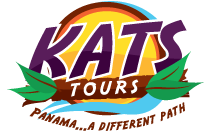About Panama
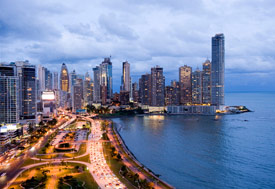 Panama is located in the middle of the American continent.
Panama is located in the middle of the American continent.
Climate
It is a 100% tropical with temperatures around 80-90 degrees Fahrenheit (about 25 - 30 degrees Celsius). There are two seasons: the dry season with a bright sun from December to April and the rainy season from May to November. You can also enjoy temperatures of 12 to 15 degrees Celsius in the highlands of the Province of Chiriqui close to the border with Costa Rica as well as in the Valley of Anton and Cerro Azul at one hour and a half and 40 minutes from downtown Panama City respectively. Good News!!! Panama is situated south of the hurricane track and generally not affected by these tropical storms.- Area, coasts and islands
Panama covers an area of 75,517 square kilometers with more than a 1,000 miles of coasts and 1,000 islands on the Pacific side and 800 miles of coasts and 600 islands on the Caribbean side.
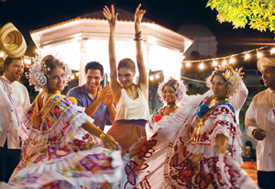 Population
Population
There is an estimated population of 2,329,329 (1990 census) with 40% residing in Panama City.
Languages
Spanish is the official language but most Panamanians speak English fluently.
Currency and Banking
The currency is the Balboa which has the same value as the U.S. dollar. The U.S. dollar is legal tender in Panama by a 1904 agreement between the two countries. Therefore Panama does not print bank notes but only mints its own coins. Panamanian coins are 50c, 25c, 10c, 5c and one cent.
Banks are open to the general public from 8:00 a.m. to 3:00 p.m. from Monday to Friday; some of them until 6:00 p.m. and on Saturdays from 9:00 a.m. to 12:00 m. They are located all around Panama City and some of them have branch offices in the interior of the country. Visa American Express, Master Card and Diners Club credit cards are accepted in most hotels, restaurants and commercial establishments.
Public utilities
Panama's electrical grid covers the whole country;110-volt AC is found nation-wide. 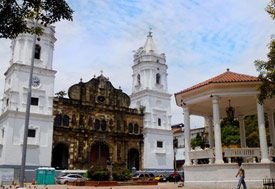 Panama has an excellent telephone and communications system which can be considered the best in Latin American and one of the most sophisticated in the world. There is potable water in all towns; qualified as one of the purest in the world, it is safe to drink directly from the faucet.
Panama has an excellent telephone and communications system which can be considered the best in Latin American and one of the most sophisticated in the world. There is potable water in all towns; qualified as one of the purest in the world, it is safe to drink directly from the faucet.
Ground transportation
Transfer from Tocumen International Airport to downtown is provided by airport taxi or limos at two different rates: US$30.00 for a maximum of two persons or US$35.00 for a maximum of three passengers. In the city, taxis are inexpensive and almost constantly available. The fares vary according to the number of zones you travel. Going outside the city limits can cost up to US$12.00. Taxis waiting at hotel entrances are air-conditioned and a little more expensive but some of the drivers are trained guides and speak English or can understand it. Buses to the interior are also comfortable, air-conditioned, with reclining seats and stereo music and very affordable.
Tocumen International Airport.
Foreign driver’s licenses are valid for up to 90 days. Speed limit is 90 km/hr. Gas stations are easy to find on the Panamerican Highway except from Panama City to Darien.
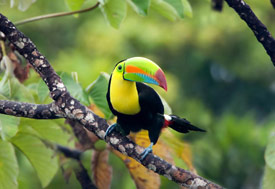 Entry and exit requirements
Entry and exit requirements
Panamanian Immigration has waived visa requirement for many countries. Check with the Panamanian Consulate in your country of residence and you may discover that a visa is no longer needed. In most cases a tourist card is sufficient and can be bought before boarding the plane at the airline ticket counter or at the Immigration Office at Tocumen International Airport after you have arrived in Panama. Tourist Cards are valid for 30 days however you can get a two-month extension at the Immigration and Naturalization Head Office in Panama City, if you submit a request 7 days before the first 30 days have expired.All tourists must pay an exit tax of US$20.00
Clothing
Bring light clothes. Panamanians are very casual most of the time but a light suit is worn for business and for visit to government authorities. Never forget to include a bathing suit when packing your suitcase. Sun glasses are recommended as well as sunscreen lotion for protection against sunburn.
If you visit the highlands of Chiriqui Province, bring a light sweater or jacket since it can be a little chilly in the evening and early morning. Good walking shoes are necessary for your excursions.
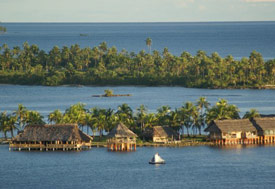 Customs
Customs
There is no restrictions on what you can bring with you for personal use. Visitors are allowed up to two cartons of cigarettes, five bottles or a gallon of liquor. A duty free zone is located at the airport before entering Customs and Immigration and is useful for last minute shopping for a gift for your friends or hosts in Panama.
Government
Panama is a constitutional republic. Executive power is held by the President assisted by two Vice-Presidents and an appointed Cabinet of ministers. The Judicial Branch is composed of a Supreme Court of Justice with nine judges appointed for 10 years terms; five superior courts, and three courts of appeal. The Legislative Branch is unicameral; the President and the legislator are elected through popular vote every 5 years.
Administrative division
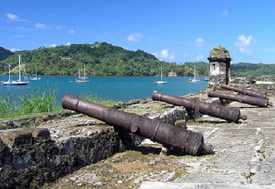 Panama is divided into nine provinces with their respective capitals. Each province is in turn divided into districts, municipalities and administrative units called corregidors.
Panama is divided into nine provinces with their respective capitals. Each province is in turn divided into districts, municipalities and administrative units called corregidors.
Economy
Because of its key geographic location, Panama's economy is service-based, heavily weighted toward banking, commerce and tourism. The Colon Free Zone and the Panama Canal play a very significant role in the country's economy by generating employment and services. Another important employment generator is the Trans-Isthmian Pipeline, which goes from ocean to ocean, from Puerto Armuelles in the Province of Chiriqui to Chiriqui Grande in the Province of Bocas del Toro.
Panama has the largest merchant marine registry in the world. This service represents the biggest foreign currency earner for the country. The main export products are bananas, rice, corn, sugar cane, coffee and shrimps bought mostly by Costa Rica, Germany and other European countries.
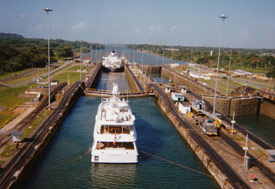 Religion
Religion
Like all Latin American countries, Panama is predominantly Catholic but other denomination are found throughout the country.
EMERGENCY PHONE NUMBERS
ZIP CODE (507)
Police
Tourism Police: 211-3365
National Police: 104
Hospital:
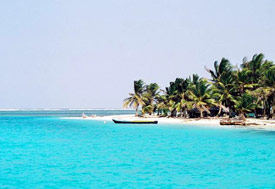 Hospital Nacional: 207-8110
Hospital Nacional: 207-8110
Hospital Santa Fé: 227-4733
Hospital San Fernando: 278-6305
Hospital Santo Tomás: 227-4122
Hospital del Niño: 225-3677
Hospital Integrado de San Miguel Arcángel: 230-2830
Hospital Psiquiátrico Nacional: 224-1670
Hospital de Salud Mental: 217-0068
Emergency:
Alerta: 269-9778 / 800-0911
SEMM Servicio de Emergencia Médica: 264-4122
SINAPROC Sistema Nacional de Protección Civil: 316-0080 ó 231-4209
Fire Department:
Grupo de Bomberos de Panamá / Group of Firemen of Panama:
Tel: 103
Cruz Roja de Panamá - Sede Central de Albrook / The Red Cross of Panama
Tel: 315-1388 / 1389
